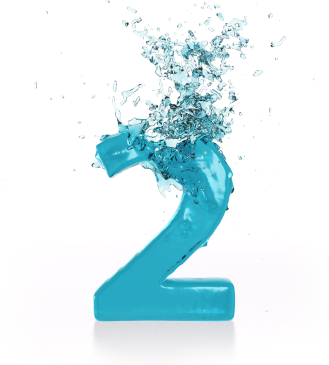Wednesday Bubble: Two is the Magic Number?
When it comes to Traditional Chinese Medicine (TCM), is two the magic number? A variety of studies have examined the utility of TCM for menopausal symptoms and some have shown good benefit. However, does combining distinct forms of TCM yield better outcomes? Moreover, are these outcomes equal to those achieved by hormone therapy?
They may very well be, according to a small study that was presented this past May at the International Research Congress on Integrative Medicine and Health. Published in BMC Complementary and Alternative Medicine, the study explores the use of a Chinese herbal formulation named Kun Bao Wan alone and in combination with acupuncture and compares it to hormone therapy. Available in powder form and priced at approximately $8.00 a box, Kun Bao Yan is used in Chinese medicine to balance hormone levels, relieve insomnia and improve blood circulation to restore healthy metabolism. A web and database search yielded almost no information on side effects, reinforcing the need to work directly with a practitioner versed in Chinese medicine versus using it on your own.
Regardless, over a two-month period, 57 women in peri- or full on menopause took Kun Bao Wan (5 gm. twice a day) alone or in combination of 5 acupuncture sessions a month, or were assigned hormone therapy. During this time, symptoms (hot flashes, tingling, insomnia, nervousness, weakness, dizziness, palpitations) were measured with a scientifically validated index. The researchers also assessed hormone levels (FSH, estradiol) and symptom severity and frequency.
The findings appear to indicate that while all three strategies can significantly decrease menopause symptom scores, better results were achieved with Chinese medicine plus acupuncture compared to Chinese medicine alone, particularly in women who were postmenopausal. Additionally, Chinese medicine plus acupuncture was on par with hormone therapy with regards to its overall effects on FSH. Importantly, none of these strategies appeared to affect levels of circulating natural estradiol.
Granted, this study is quite small. But it does show that with Chinese Medicine, two combined modalities may be better than one. And are certainly on par with hormone therapy — and perhaps even safer.
Read More
Under pressure: still drinking the HRT kool-aid?
 Proponents of hormone replacement therapy (HRT) want you to believe that the only negative analyses that are being published are the ones that examine data from the Women’s Health Initiative study. Guess what? That is not true. In fact, there is an evolving body of literature looking at other studies that are coming to similar conclusions: HRT may be a panacea for hot flashes, night sweats and mood swings. But when it comes to cancer and heart disease, you’ve got to be vigilant and aware of your risks. And yet, women continue to be ‘under pressure’ to look the other way, embrace the ‘same as it ever was’ and sift through the facts and fallacies.
Proponents of hormone replacement therapy (HRT) want you to believe that the only negative analyses that are being published are the ones that examine data from the Women’s Health Initiative study. Guess what? That is not true. In fact, there is an evolving body of literature looking at other studies that are coming to similar conclusions: HRT may be a panacea for hot flashes, night sweats and mood swings. But when it comes to cancer and heart disease, you’ve got to be vigilant and aware of your risks. And yet, women continue to be ‘under pressure’ to look the other way, embrace the ‘same as it ever was’ and sift through the facts and fallacies.
Nowhere is the confusion greater than with heart disease. Some data show that long-term HRT protects against heart disease while others suggest that HRT does not.
So does it or doesn’t it?
According to study findings published this month in PLOS ONE, it does not. In fact, the longer you use HRT, the greater your risk of developing high blood pressure, a major, proven factor in heart disease. Here’s what you need to know about this latest information:
- Researchers examined information collected on over 43,000 Australian women who were part of a large-scale study on aging. The women were 45 and older, postmenopausal, had an intact uterus and had not been diagnosed with high blood pressure prior to entering menopause.
- Factors that might influence high blood pressure risk, such as obesity, smoking or lack of physical activity were also examined. On average, the women in the study who used HRT reported having sufficient levels of physical activity, were past (but not current) smokers, drank alcohol and had a healthy body-mass index.
- In the study, the average age that women entered menopause and had ever used HRT was 48 years and most were about 52 years old when they started hormone replacement. Comparatively, women who used HRT developed high blood pressure by age 58.
- The findings showed that younger women (<55 to 61 years) who used HRT had 1.5 times the odds of developing high blood pressure than women who did not. The risk dropped slightly as women got older (between the ages of 62 and 70, HRT users had 1.2 times greater odds of high blood pressure).
- The longer that HRT was used, the greater the odds of developing high blood pressure, with highest risk among women who had used hormone replacement for 6 to 10 years or more. Again, as women in the study age, this risk appeared to decline.
One of the biggest criticisms of the Women’s Health Initiative was that it looked at an older group of women who were not representative of the average age that menopause starts. Here, the data show that in younger women, the odds of HRT being associated with high blood pressure are significant regardless of other potential confounding lifestyle factors. The investigators say that women should be prescribed HRT for the shortest time as possible and that they should be closely monitored for blood pressure before, during and after they stop hormones. Further, they state that “high blood pressure should be conveyed as a health risk for people considering MHT (menopausal hormonal therapy) use.” They also add that these recommendations are aligned with current recommendations for hormone use by the US Food & Drug Administration.
Are you still drinking the HRT kool-aid? You may want to switch beverages, especially if you care about your heart.
Read MoreShe’s a lady. Treat her with…
Care? Or with LadyCare?! This nifty, palm-sized device snaps onto your underwear and actually resets your autonomic nervous system, not to mention stimulating blood flow in order to boost the body’s ability to heal itself and restore its hormonal balance. And, it’s backed by anecdotal survey data showing significant improvements in a host of menopausal symptoms ranging from anxiety and weight gain to hot flashes, inability concentrate and sexual libido issues. What’s more? LadyCare is evidently used by more than 250,000 women worldwide. Wow! So why haven’t we heard of it before? Aren’t magnets supposed to attract, not repel? Oh wait! That depends on its magnetic field, right?
Did you know that the strength of a magnet is referred to as its ‘magnetic moment?’ Neither did I. But it seems perfect for this post because LadyCare’s moment in the spotlight is pretty repellent. Notably, if you do a search on PubMed, you may stumble across a thorough analysis of the use of static magnet therapy, not for menopause but for pain. The conclusion? “The evidence does not support the use of static magnets for pain relief, and therefore magnets cannot be recommended as an effective treatment.”
She’s a lady. Always treat her with respect. Whoa whoa whoa…
This one’s a likely dud; save your $$.
Read More
Wednesday Bubble: Politicizing Menopause
This past weekend, the International Menopause Society (IMS) issued a public statement calling on the National Institutes of Health (NIH) to revise current recommendations on use of hormone replacement therapy (HRT). In this statement, the IMS stated that it believed that the “NIH has been guilty of unbalanced reporting in failing to inform women of the latest information,” adding that it “calls on the WHI (Women’s Health Initiative) and the NIH to revise its advice to reflect current consensus — not just the initial WHI results.” IMS President Dr. Tobie de Villiers said “Of course there are differences between what the WHI thinks and what the menopause community thinks, but I think that it’s fair to say that in many ways the WHI has moved more towards our position over the last 10 years. In spite of this, they have not been particularly even-handed in presenting results. For example, the main NIH patient brochure on HRT has not been updated in the last 7 years, in spite of a wealth of new information…the least that they can do is agree that HRT is a good option for symptom relief for most women going through the menopause.”
If you’ve been following the news or this blog closely for the past four years, evolving analyses of WHI data don’t entirely support this last statement. Moreover, several organizations, including the US Preventive Task Force, the US Food & Drug Administration, the American Association for Cancer Research and the Canadian Cancer Society have issued warnings about of combination HRT or estrogen alone with regards to timing and duration of use. And, two years ago, I quoted lead study investigator for the Canadian Cancer Society — Dr. Prithwish De, who said that “The Canadian Cancer Society’s ongoing review of the evidence on HRT and breast cancer since 2003 led us to our current position and the research study findings reaffirm this position. The Society recommends that women avoid taking HRT for any reason other than to relieve severe menopausal symptoms that have not responded to other treatment. We understand that each woman’s experience with menopause is unique. If, after consulting with their healthcare professional, a woman decides to take HRT, it should be the lowest effective dose for the shortest time possible.” Notably, like the IMS, the North American Menopause Society’s recommendations also tend to minimize certain noted risks.
So, why the disconnect?
Is it at all possible that menopause has been overpoliticized, medicalized and poorly characterized, a “phenomenon not so much hijacked by medicine as gradually occupied, [with] authorities throughout the ages grimly trying and failing to define their subject?”1
In a recent editorial in Menopause journal, several authors express concern that the North American Menopause 2012 recommendations on use of HRT do not include caveats with regards to prevention of coronary heart disease (CHD) or stroke and also ignore data suggesting that longer-term use of estrogen-alone may not be safe. Noting that “long term observational data are especially unreliable for CHD (as they reflect the experience of women who were not susceptible to early risk), they add that 1) lifestyle choices have the ability to influence the likelihood of developing heart disease and 2), that generalizations as to ongoing lower risk rates should HRT not be used for longer periods cannot be assumed. They also point out that the NAMS statement blatantly understimates stroke risk on younger women who choose hormone therapy. These concerns are largely echoed by Jacques Rossouw, M.D., National Heart, Lung, and Blood Institute, Division of Cardiovascular Sciences, Chief, Women’s Health Initiative Branch, who sent me an email statement when I asked for a comment. He writes:
“WHI has made substantial contributions to our understanding of the effects of hormone therapy, providing women and their physicians with much better information on which to base an informed decision about the use of hormone therapy. In women close to menopause, the risks of short-term use of hormone therapy for treatment of hot flashes and night sweats are small, and WHI investigators have supported short-term use, provided that patients are fully informed of the risks and benefits. The main objective of the WHI was to address whether hormone therapy should be used to prevent cardiovascular disease in postmenopausal women ages 50 to79, and the data on this are overwhelming. The risk of coronary heart disease is particularly increased in older women, especially among older women with hot flashes and night sweats. Therefore, hormone therapy should not be used in older women to prevent coronary heart disease or even to relieve vasomotor symptoms (hot flashes and night sweats). Even in younger women, long-term hormone therapy is unwise because of the likely increasing risk of breast cancer over time, and uncertainty about long-term cardiovascular effects. The hormone prescriptions for older women have decreased more markedly than in younger women, and this seems an appropriate response to the data. It is not possible to evaluate whether hormone prescriptions to younger women are at an appropriate level.”
We’re drowning in politics, medicine and industry. And it’s difficult to discern truth from fiction, data from data, risk from benefit. Ongoing analyses will eventually reveal what’s what. Meanwhile, read the library of HRT posts on Flashfree. Talk to your physician. Avoid hasty decisions. And consider alternatives. If the medical community can’t agree, perhaps it’s time to put down the gauntlet and wait out the firestorm.
1. Louise Foxcroft, Hot Flushes, Cold Science. A history of the modern menopause. London: Granta Press. 2009.
Read More
Personality and hormone replacement. Give me an “A!”
Researchers say that personality plays a role in driving health beliefs, taking medication as directed and ultimately, health outcomes. However, does it also drive treatment choice?
Evidently yes, at least according to a fascinating study published online in Fertility and Sterility journal. In fact, if you are a type A (i.e., possess a sense of time urgency, are a high achiever, ambitious and competitive), you may be likelier than other personality types to make the choice to use hormone replacement therapy (HRT) during menopause. Although the reasons may be more complex than laid out in this article, they appear to be related to the desire to be self sufficient, rely on problem-solving coping strategies and a tendency to disregard threatening information when making decisions. In other words, women with type A personalities may choose hormone therapy over other options in order to attain immediate relief rather than focusing on the future and longer term delayed ramifications.
They came to this conclusion by reviewing ongoing questionnaire data over a period of 18 years that measured both personality type and hostility. Among the 1,800 or so women who completed the surveys over this time period, 51% used hormone therapy within a year of starting menopause. Despite the fact that the researchers accounted for factors such as age, psychological factors like depression and hostility, and even factors such as education, the frequency of seeing a gynecologist or degree of menopausal complaints, personality type was the only variable significantly associated with hormone replacement. Additionally, they did not find any link between hormone use before or after 2002 when the Women’s Health Initiative results were unveiled and personality type.
The researchers say that the link between hormone use and personality type may exist because menopause threatens a type A’s goals and lifestyle and the need for achievement and power, dominance and self-confidence. In order to maintain an active lifestyle and problem-solving focus, overachievers naturally reach for concrete, immediate solutions such as hormones.What’s more, the tendency to minimize information that threatens ones core belief system may also influence how one interprets benefit-risk, and the interpretation of short-term gains over long-term dangers. They also say that physicians may be more motivated to prescribe HRT to type A women because they interpret them as being “responsible, committed, decision-prone and persistent.”
I am not sure what to make of this research as I consider myself and many of my friends to be type A, driven women who make choices based less on haste and more on education. The question remains as to whether or not we are the exception or actually the rule.
What drives your health decisions? Is it an “A?”
Read More








